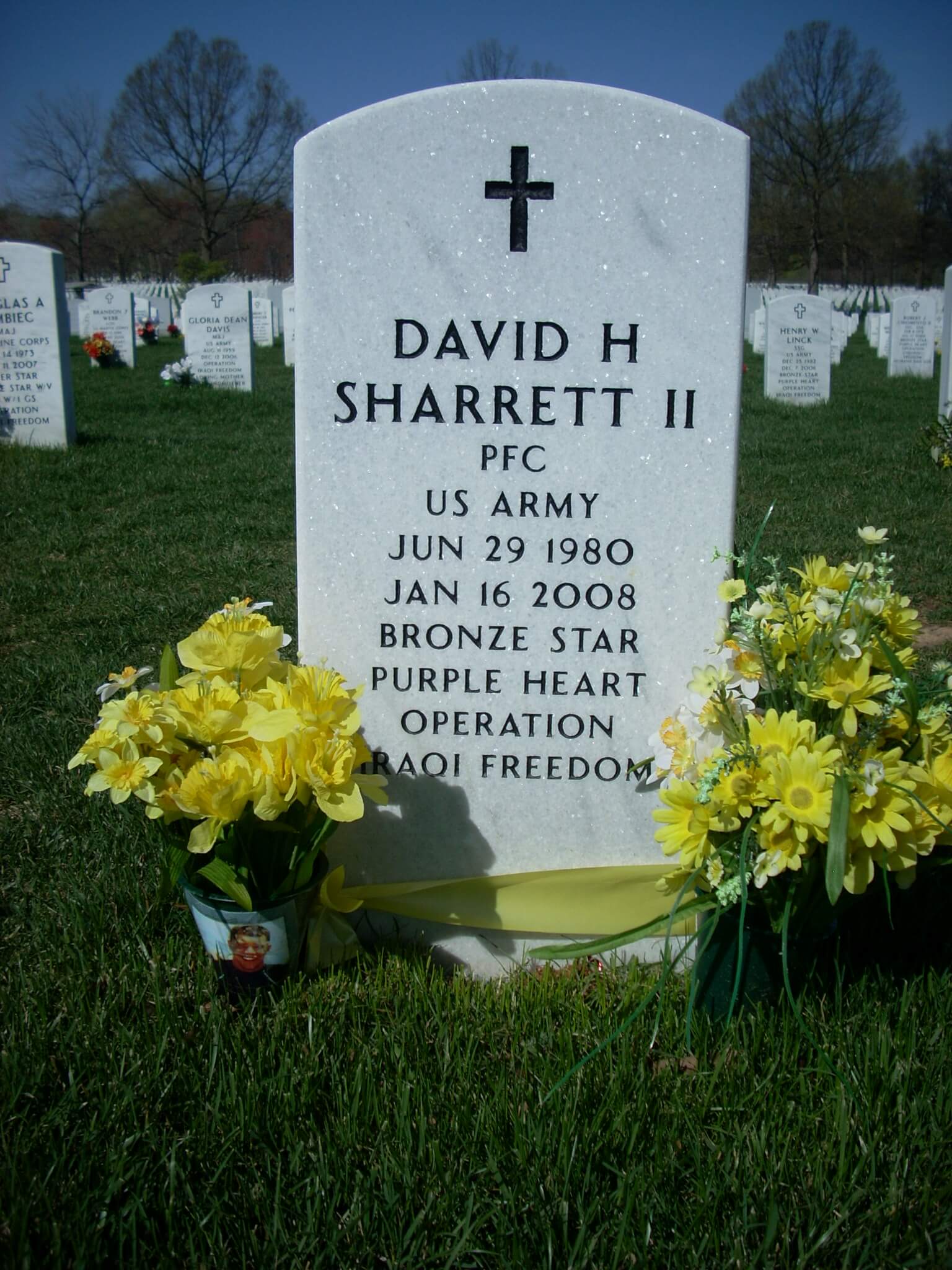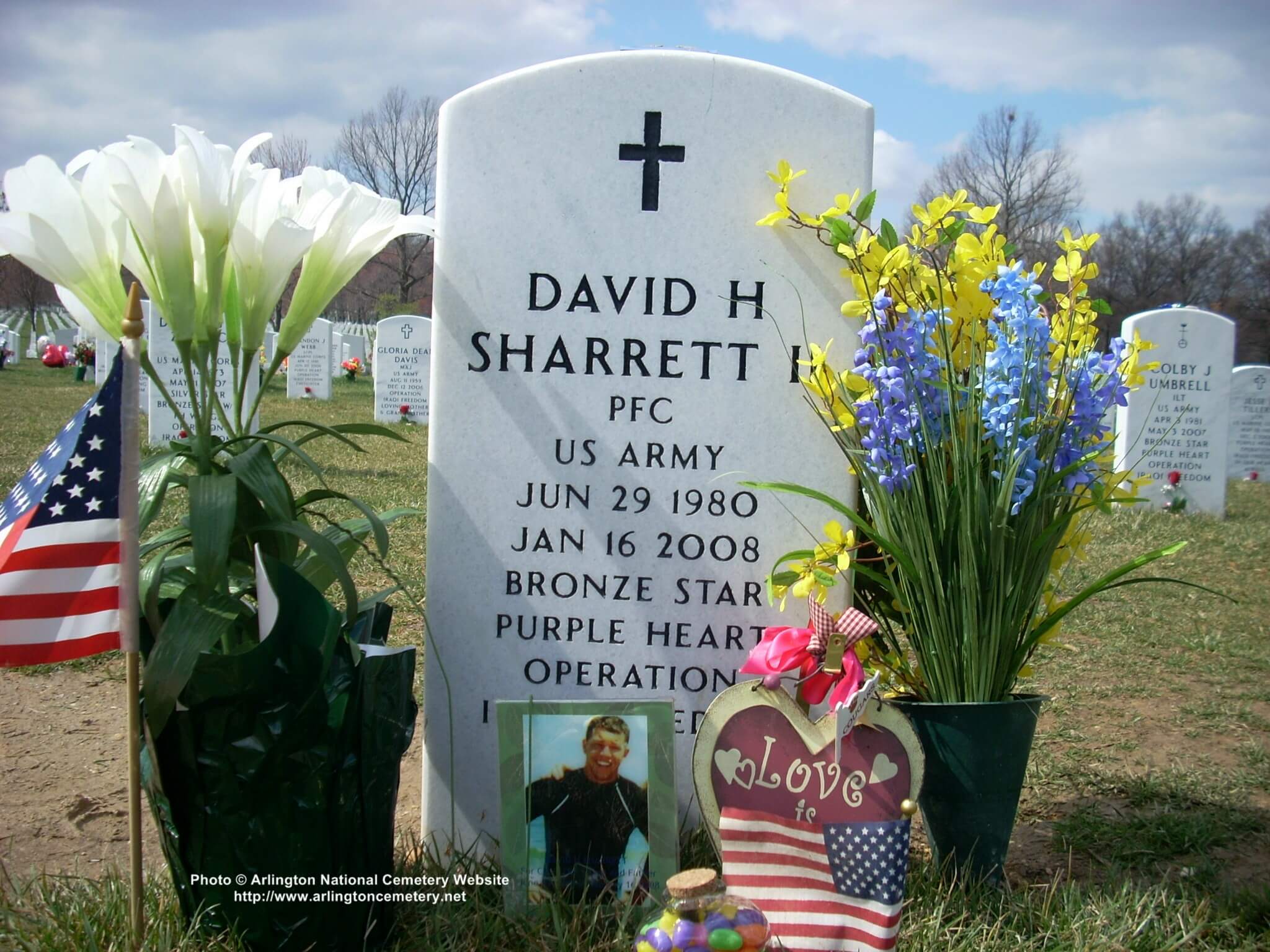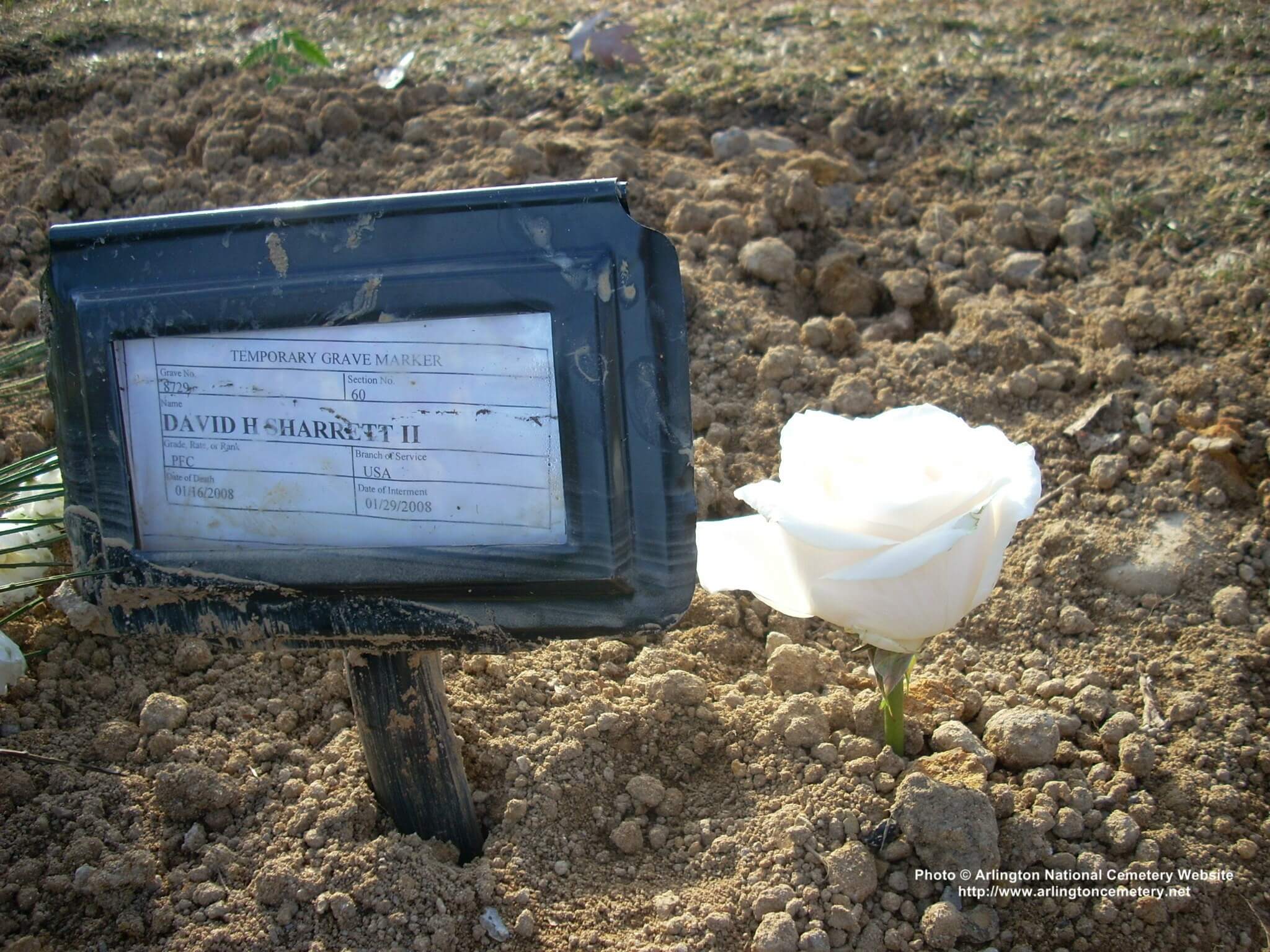U.S. Department of Defense
Office of the Assistant Secretary of Defense (Public Affairs)
News Release
IMMEDIATE RELEASE No. 0046-08
DoD Identifies Army Casualties
The Department of Defense announced today the death of three soldiers who were supporting Operation Iraqi Freedom. They died January 16, 2008, of wounds suffered in Balad, Iraq, when they were attacked by grenade and small arms fire during combat operations. They were assigned to the 1st Squadron, 32nd Cavalry Regiment, 1st Brigade Combat Team, 101st Airborne Division (Air Assault), Fort Campbell, Kentucky
Killed were:
Private First Class Danny L. Kimme, 27, of Fisher, Illinois, who died in Balad, Iraq.
Private First Class David H. Sharrett II, 27, of Oakton, Virginia, who died in Pallouata, Iraq.
Specialist John P. Sigsbee, 21, of Waterville, New York, who died in Balad, Iraq.
For more information media may contact the Fort Campbell public affairs office at (270) 798-9966.
“David joined the army because he felt, inside of him, that this was something he had to do,” said the father of Private First Class David H. Sharrett II, David, senior. “He didn’t have to do this, he wanted to do it. He knew the risks, knew he was going into a dangerous area.
“I always told him, ‘Everybody’s proud of you … nobody more than me.’”
David Sharrett’s family is arranging for David’s final return home. The 27-year-old soldier from Oakton, Virginia, was killed Wednesday, Jan. 16, after coming under grenade and small arms fire in Balad, Iraq.
In Sharrett's PARENTS’ kitchen is a photo of a grinning Vienna Youth Anklebiter football player. Athletic, big and strong, Sharrett played football through his childhood years and at Oakton High School, making State All-Star in his senior year.
“If you had to put together the kind of person you wanted to defend your country, David was that kind of guy,” Sharrett’s father said. “He was smart, tough. He was a warrior. He went out a warrior.”
Details regarding his son’s death have begun to emerge.
David Sharrett II and three fellow soldiers were helicoptered into an area of Balad where the troops faced hostile forces. The four-person squad passed a group of people they were led to believe was unarmed, but after passing by them, “all hell broke loose,” David’s father said. Attacked from the rear, two American soldiers were instantly killed, and David responded by killing the attackers. Only a single soldier survived the attack.
David was helicoptered out of Balad and died in Pallouata, Iraq, the same day, January 16, 2008.
“I know I’ve said it before, but it’s true … Dave was the toughest guy I ever knew.”
“And the gentlest,” added David’s mother, Vicki. “On our family tree, Dave was known as ‘the gentle one.’ As tough as he was on the outside, his God-given demeanor was a gentle one.”
Sharrett’s father recalled that one of the things that David enjoyed doing while in Iraq was going out to villages and handing out candy to the children.
Sharrett was born in Woodstock, Virginia, on June 29, 1980, and moved with his father here in 1982. He graduated from Oakton High School in 1999, and, in 2006, joined the U.S. Army. He completed training at Fort Benning in December of that same year, and was then stationed at Fort Campbell in Kentucky.
He was assigned to C Troop, 1st Squadron, 32nd Cavalry Regiment, 1st Brigade Combat Team, 101st Airborne Division.
Father and son were always close, and stayed in regular contact while Sharrett was away.
“[Younger brother] Chris showed me how to get into David’s ‘My Space’ page. Under ‘Heroes,’ David had written, ‘my dad.’
“I never meant to be his hero. I just wanted him to always know that there was someone on this planet who’d always be there for him … I would have done anything for him. And, I did.”
Sharrett’s father remembers the young man who always looked out for his family.
“We were at the Outer Banks and got caught in one of those storms that come through quickly, with no warning. I was there on the beach with our son, Chris, and sand was hitting at us. I huddled over Chris, protecting him from the beating sand.
“All of a sudden, the sand stopped hitting me. I looked up to see Dave behind me, covering me, shielding me, with a boogie board.”
David loved the lifestyle he led and would have done anything to protect it, his father said. Young Sharrett was a student of history, especially of military history. He wanted to be able to tell his children and his grandchildren he had served and fought during an historical time in our country.
His parents said he rarely talked about Iraq. Instead, he used to ask them what was going on here, asking about the Redskins and the family.
Parents David and Vicki are sorting through memories and photographs now, thankful for the support of friends and the military.
“Dave had six ‘best friends,’” said his father. “It was such a comfort having his friends over here, talking, laughing, and weeping with us.”
Memorial Day and Veteran’s Day will have “totally different avenues of significance” for the Sharrett family this year. “We will embrace those days, and we’ll do so proudly … with great pride,” said Sharrett’s father.
“I had a hip replaced last year,” Sharrett’s father recalls. “David was home, between Fort Benning and Fort Campbell, at that time. “We were coming home from the hospital, and Dave said, ‘Dad, you want me to carry you?’ He’s carrying me now.
“I woke up this morning and I said to myself, ‘Dave, you’re pushing me. Like being at the gym with him … ‘Dave, you’re making me work.’”
Sharrett's awards and decorations include the National Defense Service Medal, Global War on Terrorism Service Medal, Army Service Ribbon, and Weapons Qualification, M4, (expert).
“What brings me hope and comfort is that Dave’s in a better place, he’s with God, and we’ll be together again. I know that.”
Sharrett leaves his parents, two brothers, 18-year-old Chris and 12-year-old Brooks, and wife Heather, living at Fort Campbell currently.
Sharrett’s father, an English teacher at Chantilly High School quotes a line spoken by Hamlet, ‘The readiness is all.’
“If David had to go, this is the way he would have chosen. It was sort of fitting for him. He was a warrior … and a good one.”
Burial, with full military honors, is planned for Arlington National Cemetery on January 29; burial and memorial service arrangements are not yet finalized.
Army Lied About How My Son Died in Iraq: Friendly-fire Victim Was ‘Misidentified' as Enemy Gunman
Army brass in Iraq whitewashed an incident of a soldier killed by his own lieutenant by blaming the dead hero, stonewalling his family and promoting his killer, the Daily News has learned.
The friendly-fire victim, Private First Class David Sharrett, 27, of Oakton, Virginia, was “misidentified” by First Lieutenant Timothy Hanson as an enemy gunman during a botched night raid January 16, 2008, against an Al Qaeda in Iraq stronghold north of Baghdad, the Army belatedly acknowledged.
Sharrett bled to death as his buddies searched frantically for him for 25 minutes after the firefight ended.
For four months after the Army knew the truth, it still insisted to Sharrett's father that he was killed by enemy fire – and gave only atemporary wrist slap to Hanson under pressure from the families of Sharrett and two other G.I.s killed in the clash.
After The News uncovered new video evidence and raised questions, a 101st Airborne Division general said the probe into Sharrett's death may reopen.
“The final decisions and dispositions have yet to be made,” Brigadier General Steve Townsend said.
Sharrett's family claims top officers in the legendary “Screaming Eagles” division initially – and angrily – denied friendly fire was involved, claiming for months that insurgents killed Sharrett when his eight-man team tried to capture six suspects in a rural thicket.
The unit's ex-commander, Lieutenant Colonel Robert McCarthy, insists he'sbeen “nothing but open” with the families of Sharrett and two buddies killed by enemy fire that night, Corporal John Sigsbee of upstate Waterville and Private First Class Danny Kimme of Fisher, Illinois. The families of those two men blame officers for other fatal errors.
McCarthy told The News last week he knew within days of Sharrett's death that a soldier had killed him, but he was unable to prove his father was notified before May – three months after the Army finished its flawed probe. A ballistics test in February matched Hanson's M-4 rifle to the round removed from Sharrett.”The Army lied to us,” the slain hero's dad, also named David, charged Tuesday. “We felt betrayed the way our son was betrayed.”
Three days after the friendly-fire probe began on January 24, 2008, McCarthy e-mailed the elder Sharrett, claiming it was “a fierce grenade and small-arms fight that resulted in the deaths.”
The Army's probe eventually faulted Hanson, 30, of Janesville, Wisconsin, for a series of blunders, including flying away in a chopper and “leaving no leader from the team on the ground” to find and help his soldiers. But his commanders didn't punish him.
“I don't view it as colossal failures,” McCarthy said. “I think he made some mistakes.” He called Hanson a “great and steady” leader. Hanson, since promoted to Captain and serving as a brigade staff officer at Fort Campbell, Kentucky, would not return calls for comment.
Nine months after Sharrett was buried at Arlington National Cemetery, McCarthy's boss, Colonel Michael McBride, caved to pressure from the families with a temporary written reprimand for Hanson – which was removed from his file when he left Iraq days later.
This year, McBride and McCarthy reversed course again and recommended a tougher reprimand in Hanson's permanent record. But General Townsend ordered a review by uninvolved officers.
The families want career-ending punishment for Hanson, McCarthy and McBride.
“McCarthy should be relieved of duty and Hanson should be court-martialed,” said Douglas Kimme, an Illinois cop.
Officers in the initial probe blamed Sharrett for his own death.
They said Sharrett and the others didn't switch on infrared lights, which mark them as “friendly,” to other troops wearing night-vision goggles. They said Hanson shot Sharrett “mistakenly believing he was an enemy.”
After the shooting, “Sharrett's whereabouts were initially unknown” because his light “was not on,” an investigating officer wrote.
But the report ignored Hanson's own admission, backed up by one of his soldiers, that he did not give his men time to turn the beacons on, or order them to do so. That was a “leader failure,” McCarthy said
The report also omitted that an overhead drone had an infrared camera clearly displaying Sharrett's body heat, which his commanders didn't use to guide the search for the dying soldier.
Hanson left the battlefield while it was still “hot” aboard a chopper, even though four soldiers were unaccounted for, which, McCarthy said, “I would not have done.”
SHARRETT, DAVID H II
PFC US ARMY
DATE OF BIRTH: 06/29/1980
DATE OF DEATH: 01/16/2008
BURIED AT: SECTION 60 SITE 8729
ARLINGTON NATIONAL CEMETERY
Michael Robert Patterson was born in Arlington and is the son of a former officer of the US Army. So it was no wonder that sooner or later his interests drew him to American history and especially to American military history. Many of his articles can be found on renowned portals like the New York Times, Washingtonpost or Wikipedia.
Reviewed by: Michael Howard



